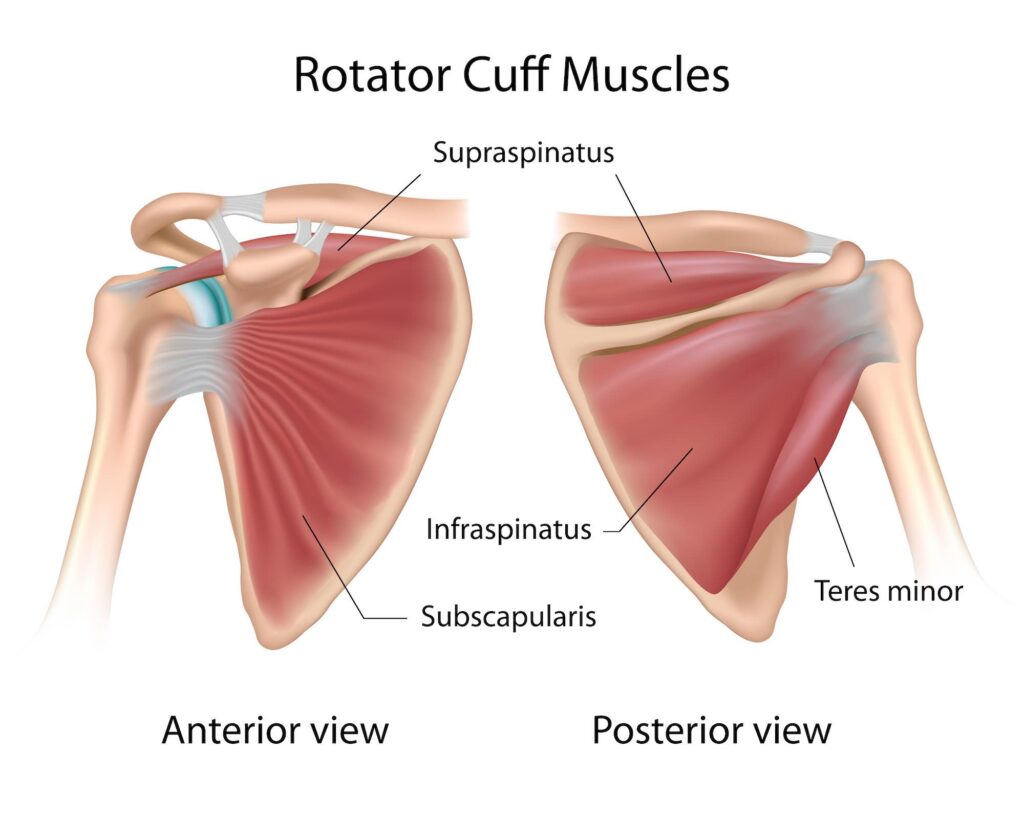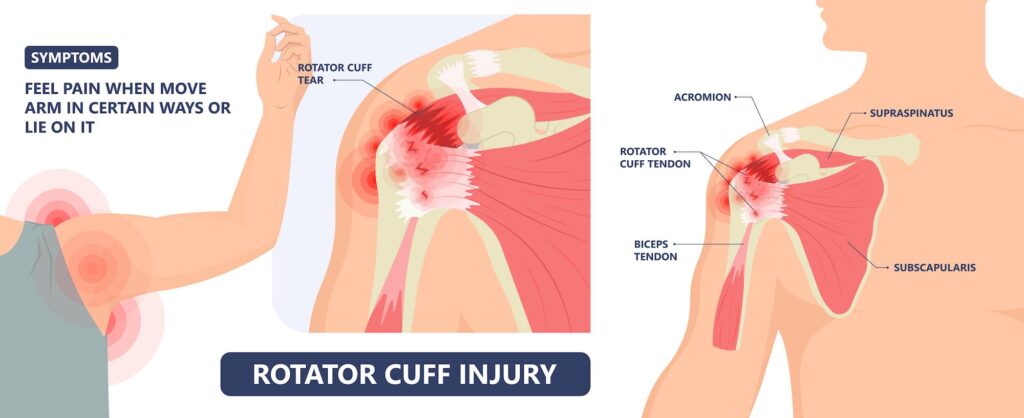If you are experiencing shoulder pain, it’s important to know the difference between rotator cuff tears and other conditions that can cause shoulder pain.
In this blog post I will help give you a better understanding of what you might be dealing with by discussing common causes, symptoms and treatment options for rotator cuff tears.
What is a rotator cuff and how do you know if you have a tear?
The rotator cuff consists of a group of four muscles – the subscapularis, the supraspinatus, the infraspinatus, and the teres minor muscles. These muscles, along with tendons surround the shoulder joint, keeping the head of the upper arm bone (the humerus) firmly within the shallow socket of the shoulder blade (or scapula). These muscles and tendons help lift and rotate the arm.

A rotator cuff tear is a tear in one or more of these muscles and tendons.
What are the symptoms of a rotator cuff tear?

If you have a rotator cuff tear, you might have pain when you try to lift your arm overhead, or you might feel like your arm is falling asleep. You might also feel pain at night, especially when you try to sleep on the injured side. Another common symptom is weakness in the affected arm.
If you are experiencing any of these symptoms, it is important to consult an orthopedic surgeon so a proper diagnosis can be made on your condition. After meeting with you to discuss your pain, I would likely order an X-ray or MRI to get a better look at the rotator cuff and see if there is any damage. It is possible that a rotator cuff may tear partially or fully.
What are the causes of a rotator cuff tear?
There are a few different things that can cause rotator cuff tears.
One common cause is injury from overuse, which often happens to athletes or people who do a lot of overhead motions with their arms, such as construction workers. Often this injury is an immediate result from a direct fall on an outstretched arm.
Another common cause is age-related wear and tear. As we age, the rotator cuff muscles and tendons can weaken and become more susceptible to tears.
Treatment options for a rotator cuff tear
Treatment options available for rotator cuff tears depend on the severity. If the rotator cuff tear is small, I might recommend rest, ice, anti-inflammatory medications, and physical therapy to help strengthen the rotator cuff muscles. A steroid injection can be helpful to provide temporary relief from pain, but is not a long term solution as it can weaken the tendon.
If the tear is more severe, surgery might be necessary to repair the rotator cuff.
Surgery for rotator cuff tears
If surgery is necessary, I would likely perform an arthroscopic repair which involves making small incisions in the shoulder and using a camera (arthroscope) to see the rotator cuff.
In the case of a full tear, I would repair the torn rotator cuff with special anchors and sutures, re-attaching the tendon to the head of humerus (the upper arm bone).
A partial tear, however, may only need to be trimmed or smoothed out, which is also known as a debridement. These surgeries usually take about an hour and can be done as an outpatient procedure, meaning you can go home the same day.
In some situations, while less common, an open tendon repair may need to be done. In this type of surgery, I would work through a larger incision to reattach the damaged tendon to the bone.
Recovery from surgery for rotator cuff tears
Following surgery, it is common to experience pain while the arm heals. I will help you with pain management and guide you through the next steps to healing. It is important to limit activity and to keep your arm in a sling for about 4-6 weeks to allow the rotator cuff time to heal properly.
Physical therapy will begin soon after surgery to help improve your range of motion and prevent stiffness.
Most people can expect a full recovery to take several months depending on severity and procedure.
If you are experiencing shoulder pain, it is important to consult an orthopedic surgeon so a proper diagnosis can be made and the appropriate treatment plan can be put into place.
Rotator cuff tears are common, but with the right treatment and follow up, you can expect a full recovery allowing you to get back to your normal activities.
If you have any questions or would like to schedule an appointment, please call my office or complete the form below.





